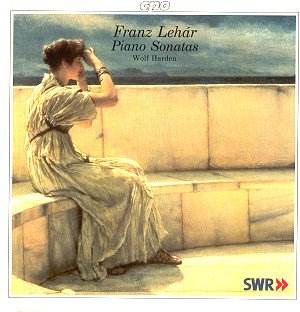Franz LEHAR
Piano Sonata in F; Piano Sonata in D minor; Fantasie in A
flat
 Wolf Harden
(pianoforte)
Wolf Harden
(pianoforte)
 CPO 999 715-2 [73'
51"]
CPO 999 715-2 [73'
51"]
Crotchet

Musical institutions have their funny ideas, and the quirk of the Prague
Conservatoire in the 1880s was that if you were an instrumentalist you couldn't
be a composer, too (evidently no one had told them about Bach, Mozart, Beethoven,
Chopin et al). At his father's insistence Léhar was enrolled as a
violinist, but his real interest lay in composition. He took a few secret
lessons from Fibich and had the opportunity to play his D minor sonata to
Dvorak, who urged him to give up the violin and switch to the composition
classes. But Léhar senior was adamant and Lèhar is to be considered
as practically a self-taught composer.
The works on this disc all belong to his Conservatoire period and were written
between the ages of 16 and 17. In these same years Léhar wrote two
further sonatas and two scherzos. Thereafter his only piano works were twelve
salon pieces published in 1909. I owe all this information to Stefan and
Peter Frey's notes which perhaps overstate the case for the music but appear
to be admirably researched as regards the facts.
Despite Dvorak's praise and the booklet-writers' pleading, it is the F major
sonata which I found most engaging. The first movement in 6/8 time has a
jig-like rhythm and a coincidental resemblance to a (much later) song by
Stanford which gives it a rather Irish feel, for a British listener at least.
The slow movement is not especially characterful but the remaining two maintain
the early-morning freshness of the first, even though one becomes increasingly
aware that the themes are short-breathed and not very memorable. Léhar
was as yet unable to tap the vein of melodic gold which nature had given
him.
The D minor sonata is too long for its own good (almost 40 minutes), ramshackle
in construction and, again, unmemorable. Its finale does include, however,
the one moment on this disc which points to the future, where a saucy dance
tune goes through some equally saucy modulations. A lack of firm construction
matters less with the Fantasie, but the lack of memorable themes does.
This ultimately comes into the "interesting-to-have-heard-it" category, though
I shall return to the F major sonata from time to time. As far as I can tell
without a score the performances are excellent, appreciative of the music's
merits without trying to give it more weight than it can bear. The recording
has a fine bloom so those interested in the byways of romantic pianism need
not hesitate.
Christopher Howell

